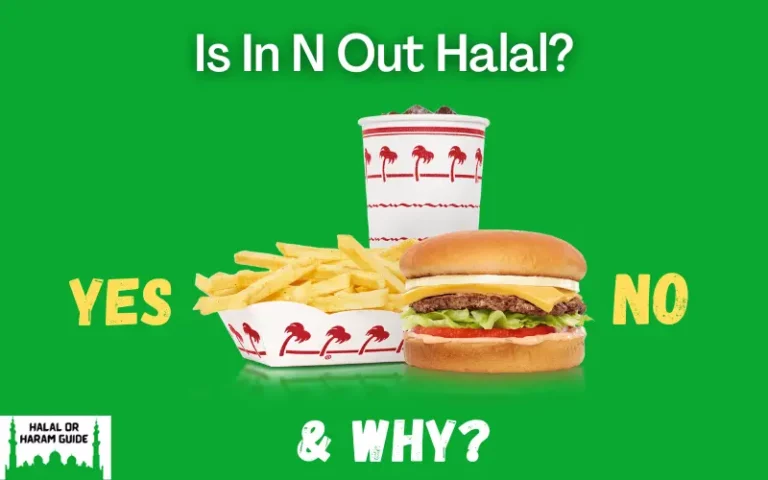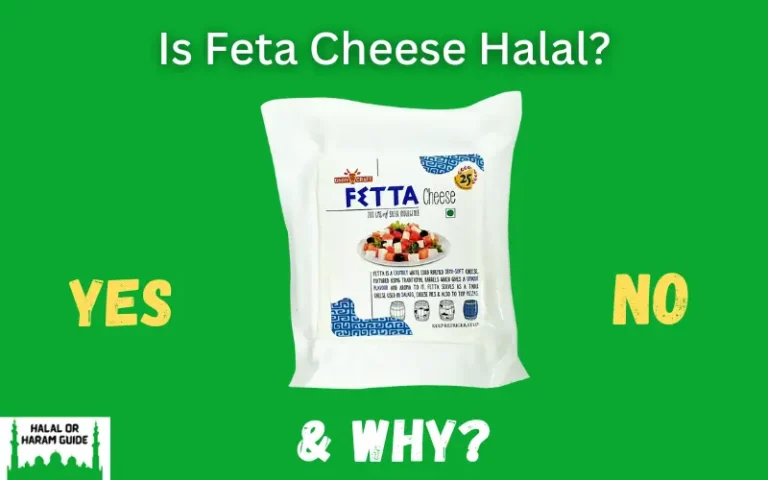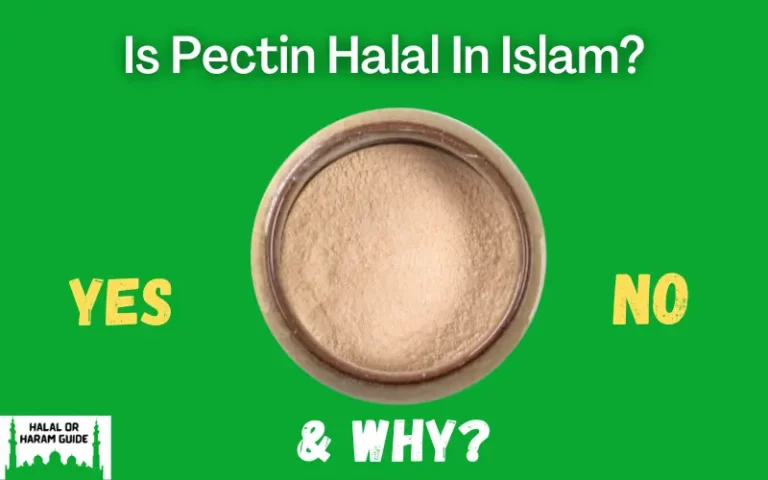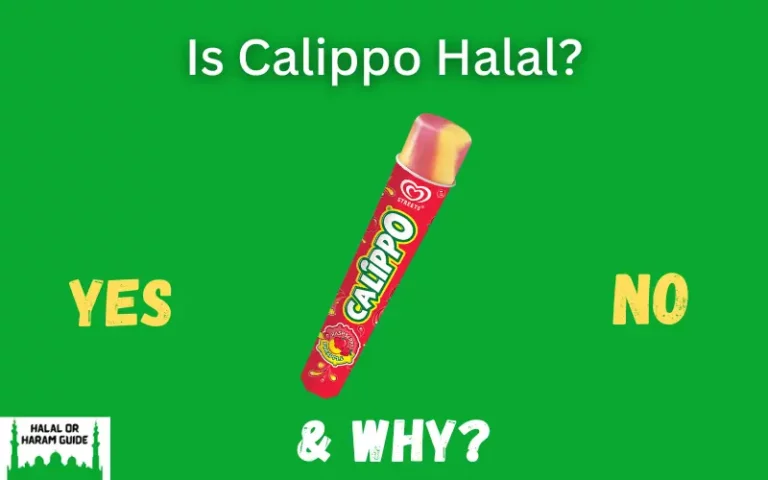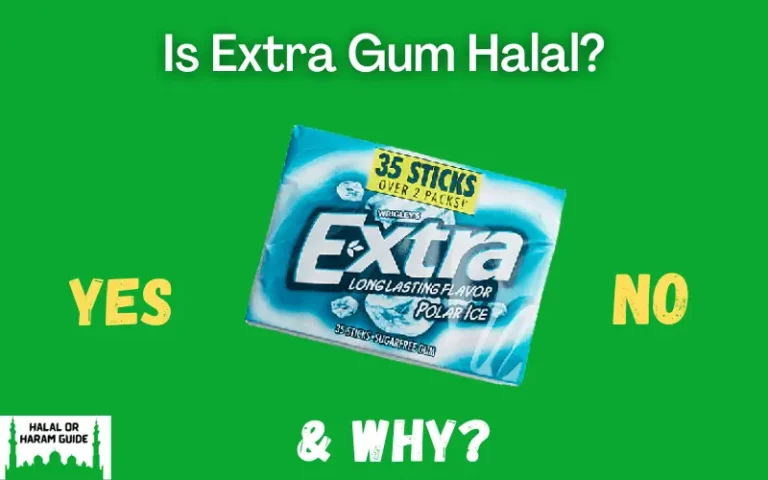Is Locust Bean Gum Halal Or Haram (E410)?
Have you seen locust bean gum (E410) listed on an ingredient label and wondered if it is halal or haram?
Locust Bean Gum, also known as carob bean gum, is a food additive that has been used for centuries and still remains popular and found in foods and beverages.
It’s derived from the seeds of the Carob tree and is commonly used to thicken and stabilize food products. It is also used as a vegan alternative to gelatin and can be found in items such as desserts, yogurt, dairy substitutes, and salad dressings.
But is it halal?
In this post, we’ll discuss the Islamic perspective on is locust bean gum halal (E410) or haram. And also share the reason for our answer.

Is Locust Bean Gum Halal?
The answer is yes, locust bean gum is halal. This is because it is made from the seeds of the carob tree and is an entirely plant-based ingredient.
In Islam, plants are generally considered halal by default so long as they are not toxic or poisonous. As such, locust bean gum is deemed halal as its production has no haram ingredients.
It should be noted that if you see Locust bean gum or E410 used as ingredients in products, it doesn’t mean the entire product is halal.
The Locust bean gum itself is halal, but there could be other ingredients in the product that are not halal. That is why it’s important to always read ingredient labels carefully before determining if a product is halal or haram.
If you’re confused about Xanthan gum, you can also read is Xanthan gum halal.
How Is Locust Bean Gum Processed?
Locust bean gum is made from the seeds of the carob tree. The seeds are collected and then ground into a powder before being added to foods or beverages as an additive.
The process is simple, and no haram ingredients are used in production. This makes it a suitable ingredient for Muslims who wish to consume products that are considered halal.
Why Is Locust Bean Gum Used?
Locust bean gum has been used in food and beverage production for centuries. It adds texture, structure, and stability to foods.
It can also be used as a vegan alternative to gelatin, which makes it ideal for plant-based or halal diets. In addition, it has a neutral flavor and does not affect the taste of foods or beverages.
Pectin is also used wisely in several products, and if you’ve no idea about its halal status you can read is Pectin halal.
In What Products Is Locust Bean Gum Used?
You can find locust bean gum in a variety of food products, including desserts, yogurt, dairy substitutes, and salad dressings. It has also been used in some pharmaceutical products.
It should be noted that the amount of locust bean gum in these items is typically very small. Therefore, it does not have a major impact on the overall halalness of the product.
What Is E410 and Is It Halal?
The ingredient label may list locust bean gum as E410. This is simply an alternate name for the additive and does not change its halal status.
E410 stands for Epigallocatechin Gallate (EGCG). As previously mentioned, E410 is an entirely plant-based product and is thus deemed halal.
Also see is cream cheese halal.
The Benefits Of Using Locust Bean Gum
There are many benefits to using locust bean gum as an additive in food production.
For example, it can help improve the texture and stability of foods while adding a creamy mouthfeel. It also helps thicken liquid mixtures without changing the flavor. Additionally, it is vegan-friendly and doesn’t contain any animal products. Therefore, it can be used in halal-friendly products.
Finally, it is also relatively inexpensive compared to other food additives and doesn’t require special processing or storage requirements.
If you like Trident gum, you must read is trident gum halal.
FAQs
Q. Is carob bean gum hala?
Yes, carob bean gum is halal. It is made entirely from the seeds of the carob tree and contains no haram ingredients in its production.
Q. Is E410 halal?
Yes, E410 is another name for Locust Bean Gum, and it is considered halal due to being derived solely from the seeds of the carob tree.
Q. Does locust bean gum have gelatin?
No, locust bean gum does not contain gelatin and is a suitable vegan alternative to gelatin. As such, it is considered halal for Muslims who wish to consume products that are deemed permissible under Islamic law.
Q. Is locust bean gum suitable for vegetarians?
Yes, locust bean gum is suitable for vegetarians as it contains no animal products.
Q. Is locust bean gum kosher?
Yes, locust bean gum is considered to be kosher as it does not contain any ingredients which are deemed non-kosher by Jewish law.
Q. What is locust bean gum made of?
Locust bean gum is made from the seeds of the carob tree. These are ground into a powder and then used as an additive in foods and beverages.
Conclusion
We hope this post has helped provide you with information on whether is locust bean gum halal or haram. As we have seen, the answer is yes, it is halal.
Locust bean gum has been used in food production for centuries, and its various benefits make it an ideal ingredient for those following both halal diet as well as vegan diets.
If you see it listed on an ingredient label, you can now be sure that it is halal and suitable for consumption. However, it’s important to always read ingredient labels carefully to ensure the entire product is permissible under Islamic law.
I hope you found this post useful and informative. Stay tuned for more posts on Islam-related topics.


